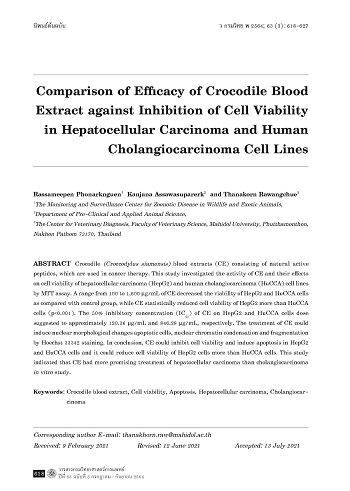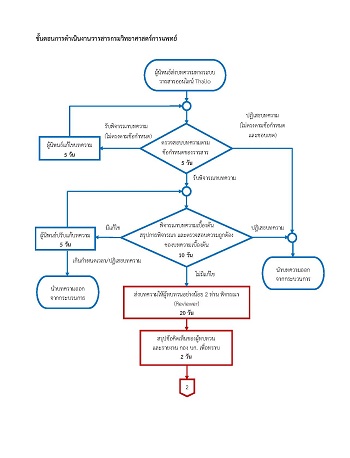การเปรียบเทียบประสิทธิภาพของสารสกัดเลือดจระเข้ในการยับยั้งเซลล์มะเร็งตับ และเซลล์มะเร็งท่อน้ำดีมนุษย์
คำสำคัญ:
สารสกัดเลือดจระเข้, การมีชีวิตอยู่ของเซลล์, อะพอพโทซิส, มะเร็งตับ, มะเร็งท่อน้ำดีบทคัดย่อ
สารสกัดเลือดจระเข้ (Crocodile blood extract) ประกอบด้วย เปปไทด์ธรรมชาติซึ่งถูกใช้ในการรักษามะเร็ง การศึกษาครั้งนี้มีวัตถุประสงค์ในการประเมินประสิทธิภาพของสารสกัดเลือดจระเข้ต่อการมีชีวิตอยู่ของเซลล์มะเร็งตับและเซลล์มะเร็งท่อน้ำดีมนุษย์ด้วยวิธี MTT assay ผลการศึกษาพบว่าสารสกัดเลือดจระเข้ขนาด 100 ถึง 1,600 ไมโครกรัม/มิลลิลิตร ลดการมีชีวิตอยู่ของเซลล์มะเร็งตับได้มากกว่าเซลล์มะเร็งท่อน้ำดีเมื่อเปรียบเทียบกับกลุ่มควบคุม ค่าความเข้มข้นของสารสกัดเลือดจระเข้ที่ออกฤทธิ์ยับยั้งได้ 50% (IC50) ต่อเซลล์มะเร็งตับและเซลล์มะเร็งท่อนํ้าดีมนุษย์ คือ 120.36 และ 846.28 ไมโครกรัม/มิลลิลิตร นอกจากนี้ยังพบว่าสารสกัดเลือดจระเข้จะเหนี่ยวนำทำให้เกิดการตายแบบอะพอพโทซิสโดยทำให้มีการเปลี่ยนแปลงรูปร่างของนิวเคลียส เช่น มีการหดตัวและการแตกของสายโครมาติน ด้วยการย้อม Hoechst 33342 สรุปผลการศึกษาได้ว่าสารสกัดเลือดจระเข้สามารถยับยั้งการมีชีวิตของเซลล์มะเร็งตับและเซลล์มะเร็งท่อนํ้าดีมนุษย์ได้โดยสารสกัดเลือดจระเข้จะยับยั้งการมีชีวิตของเซลล์มะเร็งตับได้มากกว่าเซลล์มะเร็งท่อนํ้าดีมนุษย์ การศึกษาครั้งนี้บ่งชี้ให้เห็นว่าสารสกัดเลือดจระเข้มีแนวโน้มในการรักษามะเร็งตับมากกว่ามะเร็งท่อน้ำดีที่ได้จากการทดลองในหลอดทดลอง
เอกสารอ้างอิง
Srivatanakul P, Sriplung H, Deerasamee S. Epidemiology of liver cancer: an overview. Asian Pac J Cancer Prev 2004; 5(2): 118-25.
Srivatanakul P, Parkin DM, Jiang YZ, Khlat M, Kao-lan UT, Sontipong S, et al. The role of infection by Opisthorchis viverrini, hepatitis B virus, and aflatoxin exposure in the etiology of liver cancer in Thailand. A correlation study. Cancer 1991; 68(11): 2411-7.
Srivatanakul P. Epidemiology of liver cancer in Thailand. Asian Pac J Cancer Prev 2001; 2(2): 117-21.
Hejna M, Pruckmayer M, Raderer M. The role of chemotherapy and radiation in the management of biliary cancer: a review of the literature. Eur J Cancer 1998; 34(7): 977-86.
Sirica AE. Cholangiocarcinoma: molecular targeting strategies for chemoprevention and therapy. Hepatology 2005; 41(1): 5-15.
Battle TE, Arbiser J, Frank DA. The natural product honokiol induces caspase-dependent apoptosis in B-cell chronic lymphocytic leukemia (B-CLL) cells. Blood 2005; 106(2): 690-7.
Preecharram S, Daduang S, Bunyatratchata W, Araki T, Thammasirirak S. Antimicrobial activity from Siamese crocodile (Crocodylus siamensis) serum. Afr J Biotechnol 2008; 7(17): 3121-8.
Preecharram S, Jearranaiprepame P, Daduang S, Termsiripong Y, Somdee T, Fukamizo T, et al. Isolation and characterisation of crocosin, an antibacterial compound from crocodile (Crocodylus siamensis) plasma. Anim Sci J 2010; 81(3): 393-401.
Pata S, Yaraksa N, Daduang S, Temsiripong Y, Svasti J, Araki T, et al. Characterization of the novel antibacterial peptide Leucrocin from crocodile (Crocodylus siamensis) white blood cell extracts. Dev Comp Immunol 2011; 35(5): 545-53.
Hoskin DW, Ramamoorthy A. Studies on anticancer activities of antimicrobial peptides. Biochim Biophys Acta 2008; 1778(2): 357-75.
Patathananone S, Thammasirirak S, Daduang J, Chung JG, Termsiripong Y, Daduang S. Bioactive compounds from crocodile (Crocodylus siamensis) white blood cells induced apoptotic cell death in HeLa cells. Environ Toxicol 2016; 31(8): 986-97.
Ou Y, Ho WS. Crocodile blood extract induces the apoptosis of lung cancer cells through PTEN activity. Oncol Rep 2016; 36(3): 1457-66.
Maraming P, Klaynongsruang S, Boonsiri P, Maijaroen S, Daduang S, Chung JG, et al. Antitumor activity of RT2 peptide derived from crocodile leukocyte peptide on human colon cancer xenografts in nude mice. Environ Toxicol 2018; 33(9): 972-7.
Phosri S, Jangpromma N, Chang LC, Tan GT, Wongwiwatthananukit S, Maijaroen S, et al. Siamese crocodile white blood cell extract inhibits cell proliferation and promotes autophagy in multiple cancer cell lines. J Microbiol Biotechnol 2018; 28(6): 1007-21.
Merchant ME, Leger N, Jerkins E, Mills K, Pallansch MB, Paulman RL, et al. Broad spectrum antimicrobial activity of leukocyte extracts from the American alligator (Alligator mississippiensis). Vet Immunol Immunopathol 2006; 110(3-4): 221-8.
Bridges CC, Battle JR, Zalups RK. Transport of thiol-conjugates of inorganic mercury in human retinal pigment epithelial cells. Toxicol Appl Pharmacol 2007; 221(2): 251-60.
Bragazzi MC, Cardinale V, Carpino G, Venere R, Semeraro R, Gentile R, et al. Cholangiocarcinoma: epidemiology and risk factors. Transl Gastrointest Cancer 2012; 1(1): 21-32.
Yaraksa N, Anunthawan T, Theansungnoen T, Daduang S, Araki T, Dhiravisit A, et al. Design and synthesis of cationic antebacterial peptide based on Leucrocin I sequence, antibacterial peptide from crocodile (Crocodylus siamensis) white blood cell extracts. J Antibiot (Tokyo) 2014; 67(3): 205-12.
Anunthawan T, de la Fuente-NÚnez C, Hancock REW, Klaynongsruang S. Cationic amphipathic peptides KT2 and RT2 are taken up into bacterial cells and kill planktonic and biofilm bacteria. Biochim Biophys Acta 2015; 1848(6): 1352-8.
Barksdale SM, Hrifko EJ, van Hock ML. Cathelicidin antimicrobial peptide from Alligator missisippiensis has antibacterial activity against multi-drug resistant Acinetobacter baumanii and Klebsiella pneumoniae. Dev Comp Immunol 2017; 70: 135-44.




